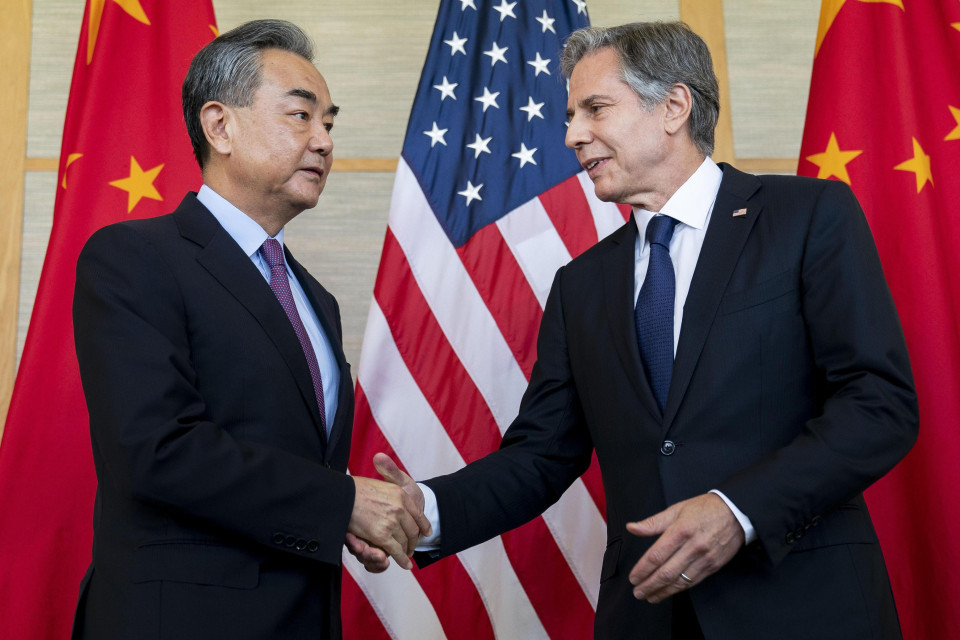
U.S. Secretary of State Antony Blinken will visit Beijing this weekend to hold talks with Chinese officials, a senior State Department official said Wednesday, as Washington seeks to lower the temperature after months of heightened tensions between the two countries.
This will be the first visit to China by a U.S. secretary of state since 2018. The trip, agreed upon by U.S. President Joe Biden and Chinese President Xi Jinping last year during a meeting in Indonesia, was abruptly postponed from its initial timing in February after a suspected Chinese spy balloon flew across the United States.
During the two-day visit from Sunday, Daniel Kritenbrink, assistant secretary of state for East Asian and Pacific affairs, said the United States has three objectives -- keeping communication channels open to reduce the risk of miscalculation, signaling U.S. interests and exploring areas of potential cooperation.
"This is not a visit in which I would anticipate a long list of deliverables coming out of it," he told reporters.
Kurt Campbell, coordinator for Indo-Pacific affairs on the U.S. National Security Council, said that despite the tense situation with China, he expects Blinken's trip to herald a series of visits in "both directions" in the months ahead.
"Intense competition requires intense diplomacy if we're going to manage tensions," Campbell said in the same press briefing with the senior diplomat. "We can't let the disagreements that might divide us stand in the way of moving forward."
He added, however, that the United States will not compromise its interests or values, while maintaining it does not seek conflict or a new Cold War.
The announcement of Blinken's trip, also the first Cabinet-level visit to China since 2019, according to Kritenbrink, came after the top diplomat spoke by phone to Chinese Foreign Minister Qin Gang.
During the conversation, Qin told Blinken that the United States should respect China's position on Taiwan and never interfere in Beijing's internal affairs.
China's Foreign Ministry also said Qin urged the United States to stop undermining its "sovereignty, security and development interests in the name of competition."
The U.S.-China relationship remains fraught over a range of thorny issues, including not just Taiwan but also differing views on human rights, Russia's invasion of Ukraine and territorial disputes in the South and East China seas.
Most recently, the relationship was marred by a media report saying that China had secretly struck a deal with Cuba to build an electronic eavesdropping station on the island.
The Wall Street Journal report last week was initially described as inaccurate by the White House, but a Biden administration official said Saturday that China has been spying from Cuba for some time, rather than it being a recent development.
On Monday, Blinken revealed that China upgraded its intelligence collection facilities in Cuba in 2019, adding that upon the formation of Biden's administration in 2021, he and some other officials were briefed on Beijing's attempts to expand its overseas logistics to enable it to "project and sustain military power at the greater distance."
Blinken's remarks have drawn a sharp reaction from China, which denounced him and other U.S. officials for "spreading rumors and smearing" Beijing.
As the strategic rivalry between the United States and China heats up, other countries are especially concerned about the risk of miscalculation and military accidents by the two countries.

China severed military-to-military communication channels with the United States after then House of Representatives Speaker Nancy Pelosi visited Taiwan in August, becoming the most senior U.S. official to set foot on the democratic island in a quarter century.
China, which has been putting pressure on Taiwan, regards the island as part of its territory to be brought under its control by force if necessary.
Campbell said the need to restore high-level exchanges between the two militaries will likely be raised by Blinken, in addition to discussing issues such as those related to Taiwan and Russia's ongoing attacks on Ukraine.
It is almost certain that Blinken will meet with the Chinese foreign minister and perhaps with Xi during his stay. But Kritenbrink said only that he will have meetings with senior Chinese officials, suggesting the top U.S. diplomat's schedule has not been finalized yet.
State Department spokesman Matthew Miller said Blinken's trip, which will also take him to London, is set to run through next Wednesday.
In London, Blinken will attend a conference on Ukraine's recovery from Russia's invasion, he said.
Related coverage:
Blinken says China upgraded Cuba intelligence facilities in 2019
Blinken planning to visit China as soon as next week: report










